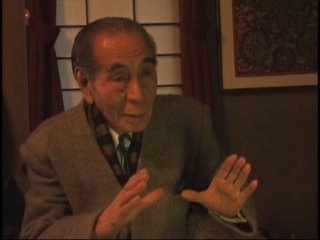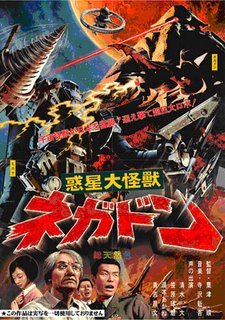Tuesday, February 14, 2006
Friday, February 10, 2006
King Kong Escapes
King Kong Escapes was one of the first giant monster movies to infect my young mind. It and Destroy All Monsters were shown during Channel 38's (or was it 9, or 11?) "monster week." Those two films are probably responsible for my fascination with giant monster movies and kaiju in particular.
To my pre-adolescent self, there was nothing more fascinating than the giant mechanical monster known as MechaniKong. He looked like the famed giant ape, but was metal head to toe. In the movie, both he and King Kong fight a T-Rex -- at least I thought it was a T-Rex, it turned out to be a Gorosaurus, a creation of Toho. There was a lot to love in this film.
Now, it's been released in a two-pack with King Kong Vs. Godzilla. I can still see what affected me as a youth, but the movie really pales in comparison to the rest of the Toho canon, and certainly with other Kong movies.
The film was actually a sequel to a 1960s Rankin-Bass cartoon, which has recently been released on DVD. I've never seen that series, so I can't comment on how the two compare.
The good: The movie is filled with neat ideas. There's a sleek submarine that the heroes patrol the waters with. There's MechaniKong, of course. The mechanical monster would later be the inspiration for MechaGodzilla. There's a crazed evil leader, that "international Judas" Doctor Who, and a conflicted agent of a unnamed Asian country. There's a mysterious Element X that could power the world, or lead to its destruction. There's electronic mind control devices. There's an Arctic command center.
And despite all these things, the movie is just not very good. Nothing in the movie is left for the viewer to figure out when a lump of exposition can be used instead. The building of MechaniKong makes no sense. It's built to dig up Element X. But it is immediately shorted out by that element. Shouldn't that have been tested before you spent millions on building a mechanical monster? Seems like a waste of resources. And for that matter, is building a giant mechanical ape any way to run an excavation site?
Logic aside, the movie just seems listless. Things happen and there's the occasional giant monster battle, but they all seem rather boring. The effects have their moments, but are generally poor. This movie came out between Godzilla Vs. The Sea Monster (initially intended to be a King Kong film) and Son of Godzilla, films that are generally considered to be the start of G's downward trend. If you look at the effects, particularly the tropical island settings, those two films are much better than some of what's seen here.
Still, the absurdity of the film is fun and I still love MechaniKong. If only Toho could bring it back. King Kong Escapes is really only for giant monster movie completists.
Image found at KensForce.
Technorati Tags: King Kong, daikaiju, kaiju
Posted by
Brian
at
10:49 AM
0
comments
![]()
Labels: king kong, mechanikong, review
Thursday, February 09, 2006
Akira Ifukube, 1914-2006

Horrible news, Godzilla music composer Akira Ifukube has died. Ifukube was one of the three people who were the heart of Godzilla, along with director Ishiro Honda and special effects director Eiji Tsubaraya. In fact, Ifukube was Godzilla's voice. It was his idea to run a metal glove down a bass string that created the distinctive sound of G's roar.
Even people who don't know about who scored the Godzilla films intuitively know Ifukube. When you hear those first bass notes of Godzilla's theme, you know the giant monster is about to arrive. For me, his themes for the movements of the military and the actions of the heroes always cheer me up. They are march songs, stirring and moving. I could listen to them at any time.
Here's what Steve Ryfle says about Ifukube in his book "Japan's Favorite Mon-Star" (which is a classic book about Godzilla, a must read):
A KAIJU CACOPHONY: The illusion of Godzilla's size and irrefutable power was reinforced by the thundering sounds of Akira Ifukube, who wrote one of the most memorable musical scores in sci-fi movie history and who supervised the creation of Godzilla's distinctive, immortal roar. Despite his background in classical music and as a composer of serious dramatic films, Ifukube never shied away from [G producer Tomoyuki] Tanaka's oddball monster movie, not even when his contemporaries said it was beneath him and urged him not to do it. After just a few introductory meetings with Tanaka, Tsuburaya, and Honda to discuss the project, Ifukube enthusiastically accepted the assignment. "Something monstrous comes out and makes you jump out of your wits!" Ifukube said. "It is sheer fear, not an abstraction, and it is global. Moreover, my specialty was biology. [Ifukube had worked in forestry.] I couldn't sit still when I heard that in this movie the main character was a reptile that would be rampaging through the city."
Ifukube also did work outside of the Godzilla films, from science fiction spectacular's like The Mysterians and Atragon to samurai classics such as they Zatoichi series. For a listing of his work, check out The Akira Ifukube Page.
It is less well known that Ifukube was an accomplished classical composer. His Japanese Rhapsody won a prestigious international prize and was first performed in 1936 by the Boston People's Orchestra.
Here's an interesting passage from David Kalat's "A Critical History and Filmography of Toho's Godzilla Series":
Ifukube's compositional style, which creates music with distinctly Asian qualities whileusing the instruments of traditiona European classical music, is one of emotional extremes and operatic values. During World War II, the Japanese military commissioned him to compose nationalistic hymns for the Pacific islands the Japanese "liberated" from the white people. Ironically, when General Douglas MacArthur arrived at Atsugi Air Force Base in August 1945 at the end of the war, the band performed Ifukubes brass band march for the Filipino people, much to Ifukube's surprise.There's a lot more about him in Kalat's book, another essential text for Godzilla fans. You can also find information on Ifukube on Wikipedia. Tim Lucas writes a well thought out piece on the composer here.
...
At the peak of his career, Ifukube scored as many as fifteen films per year, eventually scoring more than two hundred features. Ifukube's themes would make an indelible mark on listeners and would be used frequently over forty years, although ironically, he composed the Gojira soundtrack in under a week, without having seen any of the footage. Ifukube simply relied on Honda's assertion that Godzilla would be "one of the biggest things ever on the screen."
Celebrate the man's life by picking up the King Kong vs. Godzilla soundtrack, one of the soundtracks he was most proud of. (And it's always been a crime that his music was taken out of the American version of the film.) Also, check out this Amazon Listmania! for what Ifukube music is available.
This also marks the end of an era. Ifukube was the only one of the creative masters behind the original Gojira who lived past its 50th anniversary. With the composer's passing, the creators of Godzilla pass into history. Long may their work live on.
UPDATE: Picture of Ifukube found at Tokyo Monsters.
Posted by
Brian
at
11:22 AM
2
comments
![]()
Wednesday, February 01, 2006
Negadon coming to America
The film premiered at a festival in Japan and has been getting very warm reviews. Now comes news that the film has been picked up by Central Park Media for some kind of distribution in America. According to the company's press release:
Negadon
will be released theatrically this spring and on home video this
summer. Central Park Media will make further announcements at New York
Comic-Con at the end of February.
I'm really curious to see how they release this on DVD. It's a short film, so what else is going to go on the disc? We'll know in February I guess.
Posted by
Brian
at
10:04 AM
0
comments
![]()
Labels: Negadon

